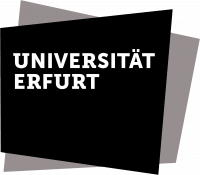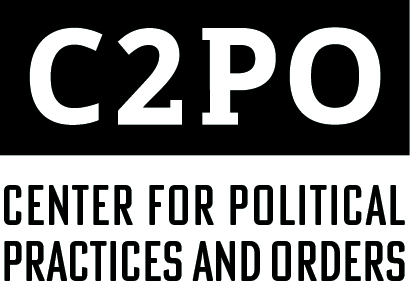Eva-Sophie Mörschel
Universität Erfurt
Staatswissenschaftliche Fakultät
Professur für Demokratieförderung und Digitalpolitik
eva-sophie.moerschel@uni-erfurt.de
Sie arbeitet zu folgenden Forschungsschwerpunkten:
- moderne Staats- und Demokratietheorie
- Öffentlichkeit und Privatheit, speziell im frühneuzeitlichen Denken
- Begriffsgeschichte, speziell Koselleck
Besonderes Interesse gilt Theorien, die dem Republikanismus zugeordnet werden können (Bodin, Rousseau, Arendt, Habermas & Pettit).
In ihrem kumulativen Promotionsprojekt untersucht Eva-Sophie Mörschel den begrifflichen Wandel und die demokratietheoretische Bedeutung der Privatsphäre vor und in der digitalen Konstellation des 21. Jahrhunderts. Ihre Forschung stützt sich auf die Erkenntnis, dass die informationelle Dimension der Privatsphäre im Zuge der Computerisierung des 20. Jahrhunderts allmählich zum Kern des modernen Verständnisses wurde. Folglich gilt der Umfang ausgetauschter Informationen heute als einer der wichtigsten Faktoren für die Bestimmung der Art von Beziehung, die eine Person zu anderen Personen und Institutionen sowohl in den öffentlichen als auch privaten Sphären des gemeinschaftlichen Lebens unterhält. ForscherInnen stimmen daher in der Auffassung überein, dass das Privatsphäre-Konzept in engem Zusammenhang mit den Grundfreiheiten steht, die durch die verfassungsrechtlichen Rahmenbedingungen moderner liberaler Gesellschaften garantiert werden. Dieses Verständnis ist jedoch unter Verdacht geraten von den heutigen technologischen Bedingungen überholt worden zu sein. Zunehmend digitalisierte Umwelten setzen Individuen dem Risiko aus, die Kontrolle über den Umfang der weitergegebenen Informationen, die Bedingungen dieser Austauschverfahren und damit über die von ihnen eingegangenen Beziehungen zu verlieren. Liberale Theorien werden häufig dafür kritisiert, diesen Autonomieverlust entweder nicht adäquat zu erfassen oder unzureichende Maßnahmen zum Schutz der BürgerInnen vorzuschlagen. Vor diesem Hintergrund verbindet Evas Projekt drei Forschungsschwerpunkte an der Schnittstelle von politischer Theorie und Begriffsgeschichte:
- Rekonstruktion eines frühneuzeitlichen europäischen Zugangs zu Privatsphäre und Souveränität, der ein Verständnis von Privatsphäre und ihrem politischen Wert vor der Verbreitung moderner Informationstechnologie sichtbar macht.
- Analyse von Privatsphäre-Verständnissen, die schon vor der Jahrtausendwende im Kontext früher Versuche zur Entwicklung dezentraler Verschlüsselungstechnologien entstanden sind.
- Konsolidierung einer Konzeption von Privatsphäre, die befähigt, informationelle Überwachungsmacht im 21. Jahrhundert einzudämmen und demokratisch republikanische Prinzipien zu verteidigen.
She works on the following areas:
- modern theories of the state and democratic theory
- public and private, esp. in early modern thought
- conceptual history, esp. Koselleck
She is particularly interested in theories that can be assigned to republicanism (Bodin, Rousseau, Arendt, Habermas & Pettit).
In her cumulative doctoral project, Eva-Sophie Mörschel examines the conceptual change and democratic significance of privacy before and in the digital constellation of the 21st century. Her research builds on the finding that, in the wake of the 20th century’s computerisation, the informational dimension of privacy has become accepted as the core of the concept’s modern understanding. Consequently, the scope of exchanged information has come to be recognised as one of the most important factors in establishing what kind of relationship an individual has with other persons and institutions in both the public and private spheres of communal life. Privacy scholars therefore widely agree on the concept’s close relationship with the basic freedoms guaranteed by the constitutional frameworks of modern liberal societies. However, under today’s technological conditions, such an understanding of privacy is suspected of being outdated. Increasingly digitised environments expose individuals to the risk of losing control over the extent of information shared, the terms on which these exchanges occur and, therefore, the relationships they form. Liberal theories are often criticised as either insufficient to capture this loss of autonomy or inadequate in proposing measures to protect citizens against it. Against this background, Eva’s project combines three research interests at the intersection of political theory and conceptual history:
- Reconstructing an early modern European approach to privacy and sovereignty, showcasing an understanding of privacy and its political value before the spread of modern information technology.
- Analysing privacy understandings that began to emerge before the turn of the 21st century in the context of early attempts to develop decentralised encryption technologies.
- Consolidating a conception of privacy capable of contesting informational surveillance power(s) in the 21st century, in defence of democratic and republican principles.
Kurzbiografie
- 2021-2024: Christoph-Martin-Wieland-Stipendium – Politische Theorie, Universität Erfurt
- 2020: Prae-Doc-Stipendium – Politische Theorie, Universität Erfurt
- 2019 – 2020: Tutorin, Propädeutikum – Soziologie, Goethe Universität, Frankfurt am Main
- 2018 – 2019: Studentische Hilfskraft – Graduierten Akademie, Friedrich-Schiller-Universität, Jena
- 2017 – 2019: Studentische Hilfskraft – Slawistische Literaturwissenschaft, Universität Erfurt
- 2016 – 2019: M.A. Politikwissenschaften – Friedrich-Schiller-Universität, Jena
- 2013 – 2016: B.A. Sozialwissenschaften & Slawistik – Universität Erfurt
Short Vita
- 2021-2024: Christoph-Martin-Wieland-Scholarship – Political Theory, University of Erfurt
- 2020: Prae-Doc-Scholarship – Political Theory, University of Erfurt
- 2019 – 2020: Teaching assistant, preparatory course – Sociology, Goethe University, Frankfurt am Main
- 2018 – 2019: Assistant – Graduate Academy, Friedrich-Schiller-University, Jena
- 2017 – 2019: Assistant – Slavonic Literature Studies, University of Erfurt
- 2016 – 2019: M.A. Political Science – Friedrich-Schiller-Universität, Jena
- 2013 – 2016: B.A. Social Sciences & Slavonic Studies – University of Erfurt
Publikationen // Publications:
Mörschel, E.-S. (2022, November 24). Bodins Souveränitätsverständnis und das republikanische Ordnungsideal der Freiwilligkeit – ein Impuls aus vorstaatlichen Zeiten. theorieblog.de. https://www.theorieblog.de/index.php/2022/11/bodins-souveraenitaetsverstaendnis-und-das-republikanische-ordnungsideal-der-freiwilligkeit-ein-impuls-aus-vorstaatlichen-zeiten/
Vorträge // Presentations:
April 2025: ‚Towards an Early Modern Approach to Privacy. Bodin’s Conception of Private Contemplation‘ – 1st Interdisciplinary Intellectual History Conference, Lost in Time. Intellectual History before the Guillotine, University College London, London
Dezember 2024: ‚From Co-Evolution to Collision. Emerging Technologies and The Liberal Impasse on Privacy‘ – 25th International Conference of The History of Concepts Group, Political Ideologies. Tracing the History of Concepts and Languages in a Global Context, Rio de Janeiro
April 2022: ‚Normative Impulse zur Privatsphäre. Zwischen liberalem Autonomiebegriff und neorepublikanischen Freiheitsideal‘ – Tagung, Privatheit 2.0. Interdisziplinäre Sichtweisen zur Privatheit im digitalen Zeitalter, Hans-Böckler-Stiftung, Dresden
September 2018: ‚Public and Private in Rousseau’s Republic‘ – 7th London Summer School in Intellectual History, University College London & Queen Mary University
Lehrveranstaltungen // Teaching
Workshop, Research Week der Hochschule Fulda, mit Robert Landwirth (TU Darmstadt, PANDA), SoSe 22: In Sorge um Privatheit // Worries about Privacy
BA-Seminar, SoSe 22: Ursprünge moderner Staatstheorie – Souveränitätskonzepte von Bodin bis Rousseau // Theoretical origins of the modern state – concepts of sovereignty from Bodin to Rousseau)
BA-Seminar, WiSe 21/22: Jean-Jacques Rousseaus Theorie der besten Regierungsform // Jean-Jacques Rousseau’s theory of government
Akademische Kompetenztrainings // Academic Skills Trainings:
Upcoming:
Oktober 2025: ‚Future-Proof Knowledge and Reference Management‘ – Online, Career and Qualification Programme, University of Erfurt. https://www.uni-erfurt.de/en/research/academic-career/academic-career-and-qualification-programme/workshop-detail/future-proof-knowledge-and-reference-management
Read more about Eva as an Academic Skills Trainer:
Eva is driven by the goal of transforming knowledge work into an empowering and enjoyable experience. With over four years of experience in different knowledge management and note-taking techniques, she provides guidance for researchers to make their daily work more organized and rewarding. Her workshops equip them with tools to build sustainable systems that stand the test of time, ensuring they benefit from past work.
Read more about the ‚Future-Proof Knowledge and Reference Management‘ Workshop:
This workshop welcomes qualitative researchers in the social sciences and humanities who want to enhance their personal knowledge and reference management systems. Researchers striving for more ease in managing complex streams of information and shifting research interests are invited to join. They receive guidance on reorganizing daily work flows and setting up a knowledge data base.
After identifying common challenges, such as, linking research notes and bibliographic entries in an easily retrievable way, we explore the potentials of ‘Zettelkasten’ and ‘Second Brain’ approaches as solutions. One central question of our discussions is how previous data can be efficiently migrated into new systems.
Between sessions, participants are encouraged to try out networked and automated tools. Equipped with first practical experience, each participant then is ready to map out an own future-proof strategy for better knowledge and reference management.

